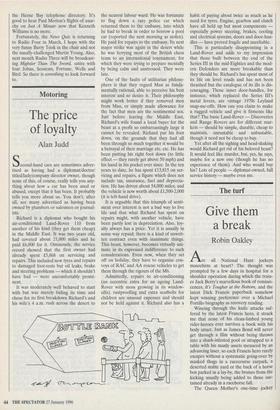Motoring
The price of loyalty
Alan Judd
Second-hand cars are sometimes adver- tised as having had a diplomat/doctor/ titled/lady/company director owner, though none of this, of course, really tells you any- thing about how a car has been used or abused, except that it has been. It probably tells you more about us. You don't, after all, see many advertised as having been owned by plumbers or salesmen or journal- ists.
Richard is a diplomat who bought his air-conditioned Land-Rover 110 from another of his kind (they get them cheap) in the Middle East. It was two years old, had covered about 21,000 miles and he paid £6,000 for it. Ominously, the service record showed that the first owner had already spent £5,868 on servicing and repairs. This included new tyres and repairs to damaged foot-rests but oil leaks, brake and steering problems — which it shouldn't have had — were uncomfortably promi- nent.
It was moderately well behaved to start with but was merely biding its time and chose for its first breakdown Richard's and his wife's 4 a.m. rush across the desert to the nearest labour ward. He was fortunate to flag down a rare police car which returned them to the embassy, into which he had to break in order to borrow a pool car (reported the next morning as stolen). He paid for repairs to the embassy. Its next major strike was again in the desert while he was ferrying most of the British chess team to an international tournament, for which they were trying to prepare mentally by being calm and unstressed. They were late.
One of the faults of utilitarian philoso- phers is that they regard Man as funda- mentally rational, able to perceive his best interest and so desire it. Their philosophy might work better if they removed men from Man, or simply made allowance for the fact that men are the sentimental sex. Just before leaving the Middle East, Richard's wife found a local buyer for the beast at a profit so embarrassingly large it cannot be revealed. Richard put his foot down, on the grounds that they had all been through so much together it would be a betrayal of their marriage etc. etc. He has been putting his right foot down (to little effect — they rarely get above 50 mph) and his hand in his pocket ever since. In the ten years to date, he has spent £13,815 on ser- vicing and repairs, a figure which does not include tax, insurance, fuel and deprecia- tion. He has driven about 54,000 miles, and the vehicle is now worth about £1,500-2,000 (it is left-hand drive).
It is arguable that this triumph of senti- ment over interest is not a bad way to live life and that what Richard has spent on repairs might, with another vehicle, have been partly lost in depreciation. Also, loy- alty always has a price. Yet it is usually in some way repaid; there is a kind of unwrit- ten contract even with inanimate things. This beast, however, becomes virtually ani- mate in its expressed indifference to such considerations. Even now, when they set off on holiday, they have to organise con- voys of RAC and AA rescue vehicles to get them through the rigours of the M6.
Admittedly, repairs to air-conditioning (an eccentric extra for an ageing Land- Rover with moss growing in its window- sills), rustproofing and extra seatbelts for children are unusual expenses and should not be held against it. Richard also has a habit of paying about twice as much as he need for tyres. Engine, gearbox and clutch have all held up but most components especially power steering, brakes, cooling and electrical systems, doors and door-han- dles — have proved fragile and unreliable.
This is particularly disappointing in a Land-Rover and adds to my impression that those built between the end of the Series III in the mid-Eighties and the mod- ern Defenders are more breakable than they should be. Richard's has spent most of its life on level roads and has not been thrashed but the catalogue of its ills is dis- couraging. Those inner door-handles, for instance, which replaced the Series III's metal levers, are vintage 1970s Leyland snap-me-offs. How can you claim to make a rugged vehicle and give it fitments like that? The basic Land-Rover — Discoveries and Range Rovers are for different mar- kets — should be simple, durable, cheap to maintain, unrustable and unbustable, though it need not be cheap to buy.
Yet after all the sighing and head-shaking would Richard get rid of his beloved beast? It would feel like murder, but, yes, he says, maybe for a new one (though he has no experience of them). And who would buy his? Lots of people — diplomat-owned, full service history — maybe even me.


























































 Previous page
Previous page